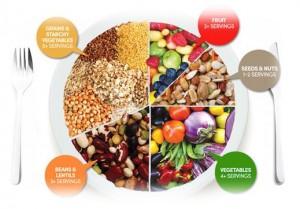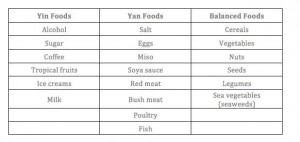Plant Based Diet and Traditional Chinese Medicine
At HolliBalance Well-Being Center, we often have patients come in with complaints related to their digestive system. Some of them experience bloating, frequent loose stool, indigestion and heart burn. More often than not, people don’t understand why they are having so many digestive system problems because they believe that they have been following healthy dietary habits. Many of them have been vegetarians for an extended period of time and thought that they weren’t prone to digestive issues due to their eating habits.

The vegetarian and vegan diets are lifestyles that have been present in societies for centuries. Scientifically, it has been proven that a plant-based lifestyle is beneficial for the people who chose to follow that path. This study is backed up by impressive facts. In comparison to omnivores, vegetarians have a much lower mortality rate as well as a reduced risk of heart diseases, diabetes and cancer. This is due to the fact that vegetarian and vegan diets contain lower levels of saturated fats and cholesterol. Additionally, plant-based diets offer higher level of carbohydrates, potassium, antioxidants, vitamins and magnesium. This means that a well balanced vegetarian diet can provide all the nutrients a carnivore diet has, but it also does so in a much healthier way.
However, everyone has a different body that functions in its own way and so requires an individual diet. This means that something can work for a person with a certain body type but harm someone with a different body type and digestive system. According to traditional Chinese medicine, each individual is born with a certain body type.
There are different body constitutions in traditional Chinese medicine
Yang: Hot Body Type
Yin: Cold Body Type
Phlegm: Damp Body Type
Dry Body Type
Neutral Body Type

The Yang/Hot body type is used to refer to individuals who often feel hot, tend to have a dry mouth and prefer cold drinks. People with a Yang body type are sensitive to high temperatures. Contrarily, Yin/Cold body types are frail and tend to often feel cold. Their preference lies with warmer food and drinks. They are rather sensitive to cold temperatures. Phlegm/damp body type is descriptive of people with a sweet tooth who are more prone to weight problems related to water retention. Dry body types experience dryness in the eyes, throat, lips and skin and are easily and often thirsty. Lastly, neutral body types do not share any of the issues the other body types encounter; they find all types of food appetizing and are not affected by any kind of weather.
In order to follow any type of diet, it is crucial for the individual to understand their body type in order to be aware of their bodies’ needs and requirements for their overall health. Generally speaking, a plant-based diet is best for people who fall under the Yang/Hot body type category. The reason behind this is a hot individual would probably be Yin deficient. This means that the individual would have excess Yang and a lack of Yin. This Yin deficiency can be caused by genetics, diseases, excess of hot food or living in an overly hot climate. Someone who lacks Yin usually has a hard time cooling down and so must avoid dry conditions as well as spicy foods such as onion, ginger, garlic and/or lamb. Instead, they should focus on eating a wide variety of fruits and vegetables such as celery, cucumber, pear, cabbage and watermelon. These are cooling foods with cold energy and they allow the Yin and Yan energy to balance one another. This is why people with Yang/Hot body type are the ones to benefit the most from a plant-based diet; a plant based diet is comprised of mostly cold and cooling foods, especially if it is a raw vegan diet.

On the contrary, someone who is Yang deficient lacks heat in their body. This happens to people with a Yin/Cold body type as well as Phlegm/Damp. People with these body types lack the natural fire we find in human being’s bodies. If Yang deficient people don’t find a way to add the extra required heat to their diet their health can easily be hurt. The reason why Yang deficient people aren’t best suited to follow a plant-based diet is because the excess yin in their body makes it difficult for them to add the heat to their diet through vegetables. People tend to follow a raw vegan diet to get the most enzymes and vitamins from their foods. However, if food is cooked at over 180 degrees, the enzymes are broken down and lose some of their power. And if a person with yin excess choose to follow a vegan diet, their body isn’t able to absorb the enzymes properly because their organs don’t work as powerfully. Their body is left depleted of nutrients and energy from being overworked. So eating a raw vegan diet is unbeneficial to their health and even makes it worse. Therefore following this diet while being yang deficient is not advised.

However, if someone who has a cold body type needs/wants to follow a plant-based diet for moral/religious reasons, there are ways to make the diet fit their needs as well as not be harmful to their health. The best advice is for the individuals with cold body types to add spices to their meals, such as ginger, cinnamon, turmeric, cloves, garlic and cumin. Furthermore, it would be best for them to slightly cook or steam all of their vegetables rather than eat them raw. This would allow the body to properly digest the “cold” food.
In conclusion, following a vegetarian or vegan diet can be done for any body type. However, it has to be done differently depending on one’s body type because each body type has different requirements to balance their yin and yang.
If interested in reading more about body types and yin and yang, read our previous blog post on http://www.yourhealthandlongevity.com/blog/yin-yang-body-types/
[…] If interested in learning more about food in traditional Chinese medicine, please refer to our previous blog post: Plant Based Diet and Traditional Chinese Medicine […]
[…] If interested in learning more about food in traditional Chinese medicine, please refer to our previous blog post:Plant Based Diet and Traditional Chinese Medicine […]
Interesting blog. Thanks for sharing this useful information with us.